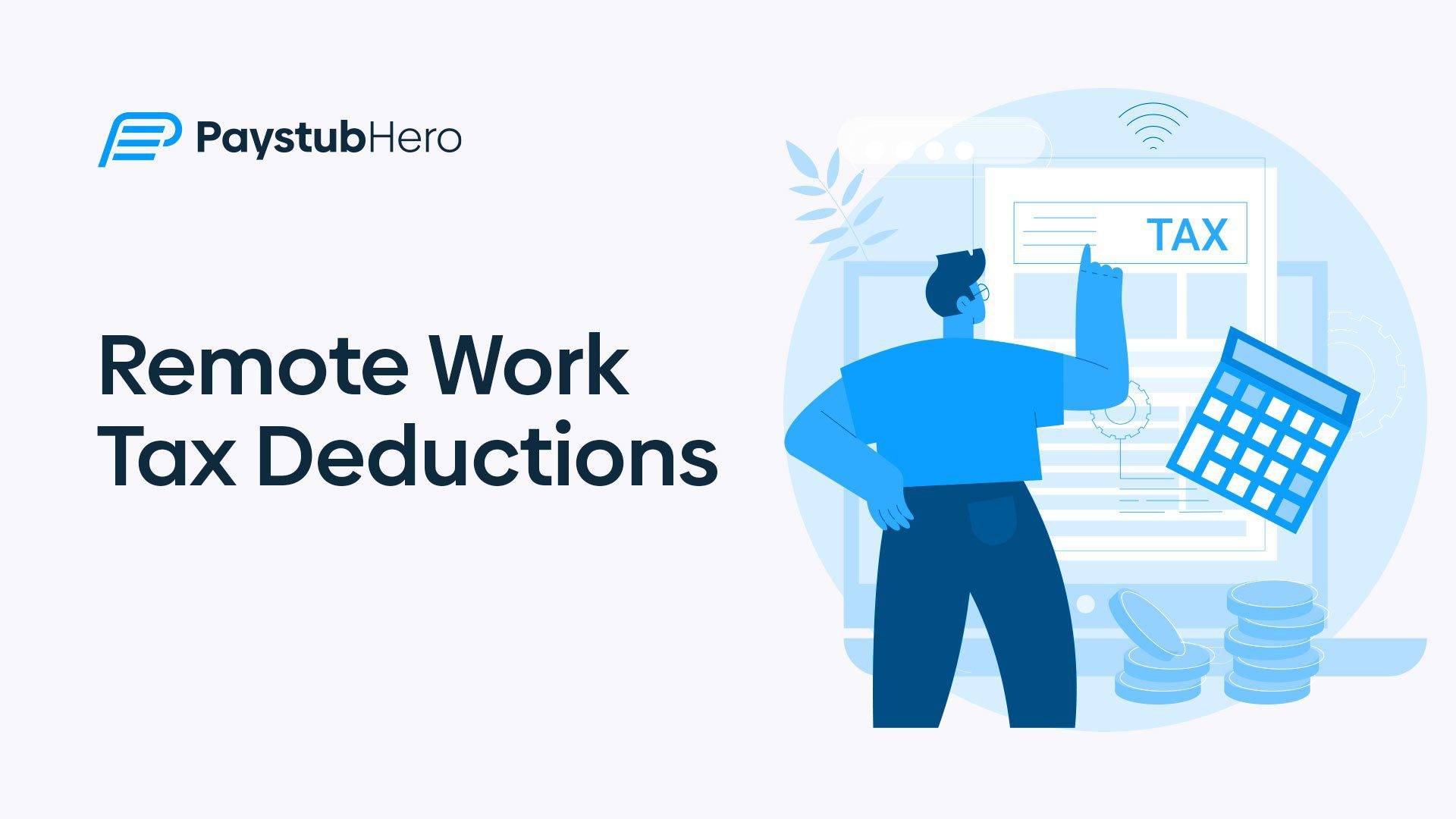If you’ve joined the growing ranks of the remote workforce, you’ve likely discovered the many advantages that come with it. No morning rush hour, the flexibility of creating your own schedule, and the chance to work in your pajamas – to name just a few.
It’s a revolutionary way of working that’s transforming the professional landscape, offering an enhanced work-life balance.
But there’s another perk that you may not be fully capitalizing on: the potential for tax benefits. You might be scratching your head, asking, “What exactly are remote work tax deductions?”
Well, the answer is simple. As a remote worker, you could be eligible for certain tax deductions related to your work arrangement.
Remote work tax deductions refer to specific expenses that remote workers can deduct from their taxable income, thereby reducing their overall tax liability. These deductions could stem from various categories, such as the use of your home as an office, utilities, and equipment necessary for performing your job, or even travel expenses for business purposes.
So if you’re a remote worker, understanding these deductions could mean more money in your pocket at the end of the tax year. And who wouldn’t want that?
In the following sections, we’ll explore the intricacies of these deductions, including the home office deduction, home to work considerations, employer-provided benefits, and a comprehensive list of work from home tax deductions.
Dive in to unlock your potential tax savings.
Table of Contents:
- Introduction: Unraveling the Mystery: Remote Work Tax Deductions
- Remote Work: Unlocking the Potential of the Home Office Deduction
- The Commute: Exploring the Intricacies of Home to Work Tax Considerations
- Employer-Provided Benefits: Maximizing Your Tax Deductions When You Work for Them
- The Comprehensive List: Navigating the Expansive World of Work from Home Tax Deductions
- Making It Simple: Paystubhero to the Rescue in Streamlining Your Remote Work Tax Deductions
Remote Work: Unlocking the Potential of the Home Office Deduction
The Home Office Deduction is one of the most significant potential tax breaks for remote workers. Whether you’re a freelancer, an entrepreneur, or an employee working remotely, the chances are that you’re spending a fair chunk of your time working from your home.
The space that once served as your cozy living room or a spare bedroom may now be your primary place of business. And with this transition comes financial implications – ones that can work in your favor.
To qualify for the Home Office Deduction, the IRS requires that a portion of your home is used exclusively and regularly for your business. This means that whether you’re hosting Zoom meetings in your home office or strategizing your next big project in your converted attic, the space you use for work could help reduce your tax bill.
The Home Office Deduction covers both homeowners and renters, encompassing a variety of dwellings including apartments, houses, and even mobile homes.
So, how does it work in practice? The calculation involves measuring the area of your home that’s used for your business operations and determining what percentage it is of your entire living space. This percentage is then applied to eligible home expenses, such as mortgage interest or rent, utilities, and home repairs.
For instance, if your home office constitutes 10% of your home’s total square footage, you can deduct 10% of these costs.
The Home Office Deduction can be a game-changer, potentially saving you a considerable amount of money come tax time. However, it’s important to ensure you meet the necessary criteria and maintain accurate records to substantiate your claim. Remember, this isn’t just about saving money; it’s about confidently and legally exercising your rights as a remote worker.
The Commute: Exploring the Intricacies of Home to Work Tax Considerations
Commutes are generally viewed as the tedious chore of working life. For remote workers, however, the journey from home to work has taken on a whole new meaning. You might be swapping train rides for a few steps down the hall, or trading in traffic jams for a leisurely walk to your home office.
Despite the lack of traditional commuting, it’s still essential to understand the tax implications that come under the category of “home to work.”
The Internal Revenue Service (IRS) typically doesn’t allow deductions for commuting expenses. After all, in the traditional sense, commuting to work is considered a personal expense.
However, the game changes slightly for remote workers, particularly those who are self-employed and have a dedicated home office.
If you have to travel from your home office to meet clients, attend work-related events, or for other business purposes, these travels can be deductible. The key here is to ensure that these trips are necessary for your work and not just for personal errands or convenience.
For instance, suppose you’re a freelance graphic designer who works from home. If you have to drive to a client’s office for a meeting or to a print shop to collect materials, these miles could be deductible.
Similarly, if you’re a remote employee attending a work conference or a training event, you might also be able to deduct these travel expenses.
However, these deductions come with their own set of rules and restrictions, and maintaining accurate records is crucial. Documenting the purpose, distance, and frequency of your travels can substantiate your claims for home to work deductions and save you from potential headaches during tax season.
In essence, your home to work travels could present potential tax-saving opportunities, redefining the concept of commuting in the world of remote work.
The daily grind of commuting might be a thing of the past for remote workers, but the tax implications of home to work travel remain relevant and potentially rewarding.
Employer-Provided Benefits: Maximizing Your Tax Deductions When You Work for Them
Whether you’re at the office or working remotely, the fundamental premise remains the same: “you work for them.” Being an employee means you’re working for an employer, a relationship that comes with its own set of tax implications. Particularly in a remote work scenario, understanding potential tax deductions tied to employer-provided benefits can make a significant difference to your tax outcomes.
While the transition to remote work is often smooth, it comes with additional costs. You may need to invest in equipment and services that enable you to carry out your duties effectively from home. These might include necessities like a computer, high-speed internet connection, or specific software.
In some cases, your employer might cover these expenses, but what happens when they don’t?
If you’re an employee who’s required to use certain tools or services for your job, and your employer does not provide or reimburse these, you might be eligible to deduct these costs from your taxable income.
This is based on the premise that these expenses are necessary for performing your job and wouldn’t have been incurred if not for your employment requirements.
However, this is where things can get a bit tricky. Tax laws are complex, and not all unreimbursed employee expenses are deductible.
Furthermore, the IRS has strict guidelines on what can be considered a necessary expense. This is why it’s always advisable to consult with a tax professional to understand what deductions you can legally claim based on your specific circumstances.
So, while you might be away from the physical office, your role as an employee still has tax advantages. It’s just about knowing where to look and how to claim them.
When you work for them, it’s not just about fulfilling your responsibilities; it’s about understanding your rights, including those related to tax deductions.
The Comprehensive List: Navigating the Expansive World of Work from Home Tax Deductions
As the shift towards remote work becomes more prevalent, the concept of “work from home tax deductions” is gaining increasing attention. These deductions serve as potential tax-saving avenues, allowing remote workers to decrease their taxable income by accounting for certain work-related expenses.
While we’ve covered some specific aspects like home office and commuting deductions, it’s equally important to have a broader understanding of the potential deductions available to you as a remote worker.
Work from home tax deductions span across a wide range of categories, all intended to recognize the costs associated with doing your job remotely.
From the apparent like office supplies and equipment, to the less obvious ones like a portion of your utilities and home insurance, there’s a vast array of expenses that could qualify for deductions.
For instance, you might be using your personal laptop for work, or perhaps you had to invest in a new ergonomic chair for your home office. Maybe you’ve noticed a surge in your electricity bill ever since you started working from home.
Or it could be that you’ve had to increase your internet speed to ensure seamless video calls. All of these costs are essential for your work, and they could potentially be deductible.
The pandemic brought about a significant change in work patterns, with a whopping 42% of the U.S workforce working from home full-time in 2020. This trend shows no signs of slowing down, making the understanding of work from home tax deductions an essential part of financial literacy for remote workers.
However, tax laws can be intricate, with each deduction having its own set of eligibility requirements.
Therefore, while this comprehensive list provides an overview, always consult with a tax professional to fully comprehend and responsibly claim your work from home tax deductions.
In the world of remote work, being tax-savvy could mean substantial savings and greater financial freedom.
Making It Simple: Paystubhero to the Rescue in Streamlining Your Remote Work Tax Deductions
While the prospect of saving money through tax deductions is enticing, the process of navigating the maze of tax laws can often be a daunting task. This is where Paystubhero steps in, turning a complex process into a straightforward one.
We’re here to provide a solution that is not only more robust but also simplified, catering specifically to the needs of entrepreneurs, freelancers, small businesses, and independent contractors.
In the past, access to comprehensive payroll software was a luxury that only large businesses could afford. Smaller entities and independent workers often found themselves grappling with complicated systems or high-cost solutions.
But at Paystubhero, we believe in levelling the playing field. We provide an accessible, affordable alternative to complex payroll software, ensuring that no business is left behind.
Paystubhero is more than just a payroll software; it’s a tool that empowers you to manage your finances better.
With just a few clicks, you can generate your documents quickly and efficiently. All you need to do is enter your company or employee info, and our software will handle the calculations. It’s as easy as 1-2-3!
In addition to simplifying your payroll process, our platform can aid in your understanding and management of potential tax deductions. By providing a clear and concise breakdown of your earnings and deductions, you can make more informed decisions about your tax situation.
In essence, Paystubhero is designed to make your life easier.
Whether you’re an independent contractor seeking to simplify your payroll process or a small business owner looking to maximize your remote work tax deductions, Paystubhero is the partner you need.
So, why wait? Shed the stress and complexity of managing your payroll and remote work tax deductions.
Let Paystubhero guide you on your path to easier, more efficient financial management. Ready to simplify your payroll and maximize your remote work tax deductions? Try Paystubhero today!
Frequent Asked Question
- Can I write off home office if I work remotely?
- Yes, if you use a part of your home exclusively and regularly for business purposes, you may qualify for the home office deduction.
- How much can you write off working from home?
- The amount varies based on the percentage of your home used for business and the method of calculation you choose – actual expenses or the simplified method. Consulting a tax advisor can give you an accurate figure.
- Can I deduct office furniture from my taxes if I work from home?
- Yes, office furniture can be deducted as a business expense if it’s used exclusively for work. It’s typically depreciated over seven years.
- How do remote employees handle taxes?
- Remote employees handle taxes by documenting and claiming legitimate work-related expenses, including the home office deduction if applicable. They should consult with a tax professional to ensure compliance with tax laws.








